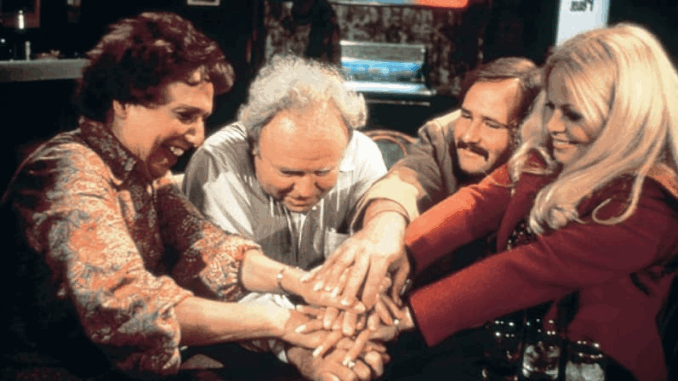
For decades, sitcoms largely played it safe, offering lighthearted escapism with predictable plots and easily digestible humor. Then came “All in the Family,” a seismic shift that dared to be different. It wasn’t just funny; it was thought-provoking, controversial, and utterly revolutionary in its approach to television comedy.
Before the Bunkers arrived on our screens, the typical sitcom family was often idealized, their problems neatly resolved within a 30-minute timeframe. “All in the Family” threw that formula out the window. Here was a family grappling with real-world issues, their disagreements often unresolved, their prejudices laid bare. This unflinching portrayal of a working-class family in a rapidly changing America resonated deeply with audiences who saw their own struggles and tensions reflected on screen.
Breaking Down Taboos with Boldness and Wit:
One of the most groundbreaking aspects of “All in the Family” was its willingness to tackle taboo subjects head-on. Racism was a recurring theme, often embodied in Archie’s outdated and offensive remarks, forcing viewers to confront their own biases. The show also explored issues like women’s liberation, the generation gap, and even serious illnesses with a blend of humor and sensitivity that was unprecedented for the time.
The Genius of Norman Lear:
The creative force behind this revolution was Norman Lear, a visionary producer who understood the power of television to not only entertain but also to spark dialogue and social commentary. He crafted characters who were flawed and complex, mirroring the imperfections of real people. The sharp, witty writing allowed the show to address serious topics without becoming overly preachy, often using humor as a Trojan horse to deliver powerful messages.
The Enduring Impact on Sitcoms:
“All in the Family” didn’t just break the mold; it shattered it, paving the way for a new era of television comedy. Shows that followed, like “Maude,” “The Jeffersons” (a spin-off directly addressing racial issues), and later hits like “Roseanne” and “Married… with Children,” owe a debt to the groundwork laid by the Bunkers. These series embraced flawed characters, tackled social issues, and weren’t afraid to challenge viewers’ perspectives.
More Than Just Nostalgia:
While “All in the Family” is a beloved classic, its impact extends beyond mere nostalgia. The show’s willingness to engage with difficult conversations remains relevant today. In a world still grappling with many of the same social and political divides, the show serves as a reminder of the power of storytelling to spark dialogue, challenge assumptions, and perhaps even foster a bit more understanding.
